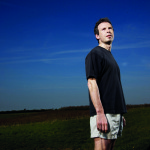With running tech becoming increasingly more efficient and economical the average runner can now afford to invest in a feature packed sports watch. But should we? Is running with a watch really that important?
In the ‘yes’ corner
Stephen Jackson is the vice-president of product engineering for TomTom Sport. He specialises in GPS, and technical sports and fitness products tomtom.com.
Should everyone run with a watch?
For beginners, it can have a motivational effect or be a reminder to go out running. Once someone has settled into their sport a little, it is natural to want to learn more, improve and be able to compare your performance over time and with friends. This is where using a watch really comes into its own.
Will running with a watch help you to become a faster runner?
Being able to measure your performance is essential to being able to improve it. There are several ways of doing this but a GPS watch is the most versatile, easy and convenient. As well as performance measurement, these watches can be used to provide training schedules for races, intervals, laps, goals, pace, distance and heart rate. Following a training programme is now easier than ever.
Are watches just another unnecessary complication?
On the contrary, a running watch should not be complicated to use. It should be intuitive and obvious, with minimal input from the runner. During the run, the aim of the watch should be to provide information – as, when and if it is wanted – in a way that does not otherwise impinge on the runner. To do this, the watch should have a large, clear display to allow for quick, at-a-glance viewing.
Doesn’t running with a watch detract from the simple joys of running?
Today, GPS watches are lightweight and relatively small; they should only be noticeable when the runner wants them to be. The one detraction often cited is having to wait for a GPS fix before the watch can be used. At TomTom, we have gone to great lengths to try to reduce this time to the absolute minimum, usually just a few seconds.
In the ‘no’ corner
Richard Askwith, journalist and author of Running Free: A Runner’s Journey Back to Nature, loves running the trails of Northamptonshire. You won’t see him wearing a watch, though.
Should everyone run with a watch?
I don’t see why – not if they don’t want to. Time matters to runners, but it isn’t the only thing that matters. By all means, time yourself if you want to, to the nearest hundredth of a second if you like. But don’t let anyone tell you that you can’t enjoy running if you don’t have a watch.
What do you think people did before watches became widely available?
Running is the simplest of sports: that’s its beauty. It shouldn’t be gadget-dependent.
Does running with a watch make you a faster runner?
No – just as weighing a pig doesn’t make it fatter. It may help (with running, if not with pigs), because honest, objective appraisal of your performance is a great motivator. But the most sophisticated chronometer in the world won’t make you faster if you don’t put in the effort. And there’s no law saying that you can’t be motivated by other things as well. I’m well into my fourth decade of running, and I find that simple enjoyment is a far more powerful incentive to get out and run than fretting about PBs.
Is an over-reliance on modern technology detracting from the simple joys of running?
Not for everyone, but I think it’s a risk we should be aware of. If you run with your focus on data – time, distance, heart-rate, cadence, how you measure up against international norms for your age and gender – then, inevitably, you’re likely to run looking inwards, worrying about your performance. To me, that’s not a great recipe for joy. I’d rather run looking outwards, at nature, at people, at the world around – so that every run feels like an adventure.
What are the benefits of running without a watch?
Take away the watch, and suddenly you have to focus on something other than measuring your performance. So it becomes a human thing, not a numbers thing – whether you’re enjoying your surroundings, or your companions, or just running mindfully, in the moment, thinking about your movements and feelings. There’s no “right” approach, of course. But I do think that if you focus on the joy of running rather than the data, you’re more likely to feel consistently enthusiastic about it. And when you reach my age, enthusiasm is the most powerful performance-enhancer there is.









